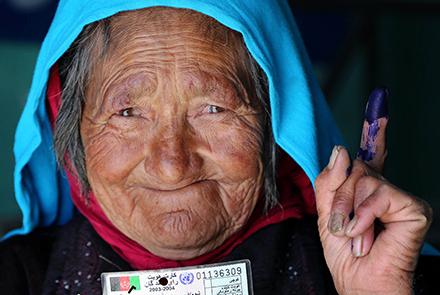Late but finally, the vibe for the next parliamentary and the very first district council elections has been created in Afghanistan.
The elections were supposed to happen at least two years ago when the legal term of the current parliament effectively ended in mid-2015.
Then, however, the newly established National Unity Government (NUG) of President Ashraf Ghani and Chief Executive Abdullah Abdullah was primarily concerned about keeping its core intact - meaning that they did not want it to fall apart abruptly in the face of growing political infighting.
Nevertheless, reforming the electoral managing bodies and restoring the credibility of the process were considered one of the top priorities of the NUG.
As one could expect, practical steps for initiating the reforms were unnecessarily delayed for months and sadly became highly politicized. Thus, the legal and technical recommendations produced by Special Electoral Reform Commission (SERC) and, later, endorsed by the government, were conceptually weak and technically irrelevant to the ground realities.
It brought no substantial change, rather than replacing a group of discredited electoral officials with several weak and pro-government commissioners, who barely understood either the policy or technical aspect of elections. In short, the reforms were derailed and it’s hard to see what will get it back on track.
Now, with less than ten months left to the scheduled July 2018 elections, both the IEC and the ECC are far from ready to create an environment conducive to assuring the populace of holding better and transparent elections than before.
Technical incompetence and diluted impartiality of the leadership have eroded the trust of many stakeholders in the commissions. In his recent briefing to the UN Security Council, Tadamichi Yamamoto, the UN Secretary-General’s Special Representative for Afghanistan, implicitly shared some concerns on the timely conduct of the elections.
“It is imperative that we hold the elections according to the plan. Timely elections will enhance the credibility of the political system and institutions. Many stakeholders, however, remain skeptical that credible elections will be held on time,” he said.
Anyway, there is much still to worry about.
But what constructive contributions could the Afghan government, civil stakeholders, and internationals make in the short span of time that still exists?
As a former official of the Election Commission, I believe that a radical recommendation like replacing the entire leadership of both commissions won’t help.
That will further delegitimize electoral institutions and, if it happens, a delay in the upcoming parliamentary and district council elections is highly anticipated. Therefore, for now, that should not be an option.
A limited number of replacements at the leading political and technical level, including the replacement of IEC chairman and some high ranking technical officers of the IEC’s secretariat, however, are pragmatic steps for improving technical and operational capacity of the electoral commissions.
On restoring the credibility of the institutions, President Ghani and his team need to adopt rather apolitical and non-intervening policies, allowing the commissions to carry out their legal and technical mission with professionalism and needed autonomy.
At this critical stage, what’s expected from the NUG leaders is a final, but decisive push for creating an intra-government mood of cooperation, particularly, on providing security, facilitating the logistics of elections, and engaging with the donor community to finance the electoral operations. With the international forces extremely limited to counterterrorism operations, now, it’s for Afghans to mobilize all government resources at national and subnational levels to support the upcoming elections.
Ironically, after wasting nearly half a billion dollars on distributing more than 20 million unverifiable voting cards since 2003, finally there is a consensus among all electoral stakeholders, including the United Nations Assistant Mission in Afghanistan (UNAMA) that establishing polling station-specific voter lists and producing a reliable voter’s database could increase procedural oversight and transparency.
The need assignment for creating such a list started a few months ago, but, due to technical incompetence and corruption in the IEC, the progress was hindered.
Technically speaking, the significance of completion of the voter’s list and its impact on transparency is second to none. Once and for all, we must create a voter’s list that identifies eligible voters and helps us to put an end to the tradition of conducting elections based on imprecise estimates.
Moreover, as it has been the case with previous elections, the political support that UNAMA provides to the process is exceptionally crucial in legitimizing the outcome of elections.
For the upcoming elections, however, not only the political support of UNAMA is required, but also it’s equally vital that electoral commissions should receive technical and policy support from a group of national and international experts through UNAMA.
The mechanism of expanding UNAMA’s technical involvement could be designed in consultation with the IEC and ECC.
Regardless of the political differences that electoral stakeholders have on how the electoral commissions are governed, which is a practice of democracy, let’s make sure that instead of offering usually quick-fix solutions right when an electoral controversy follows a fraudulent election, we rather push for some achievable reform objectives, which are technically doable and politically affordable.
Finally, considering the fluid nature of Afghan politics, a political crisis is always around the corner. Thus, it’s better to contain and solve the problem than leaving it unattended.
Tabish Forugh is an Afghan electoral expert and democracy activist. He was formerly a Fulbright Scholar at New York University, Reagan-Fascell Democracy Fellow of the National Endowment for Democracy, and Chief of Staff of Afghanistan’s Independent Election Commission. @ForughTabish.

